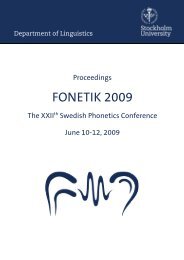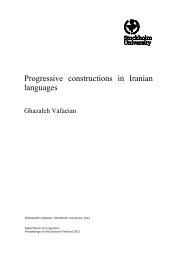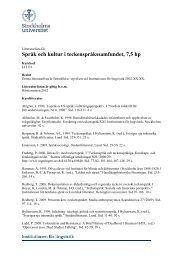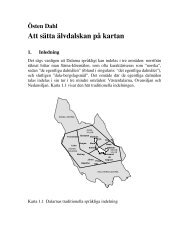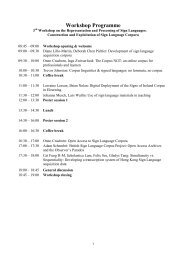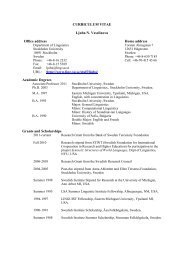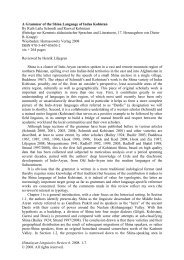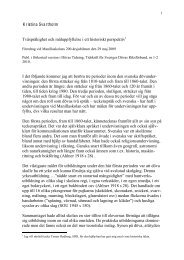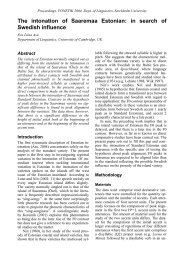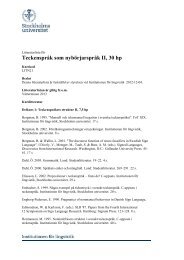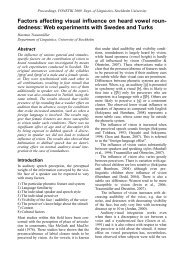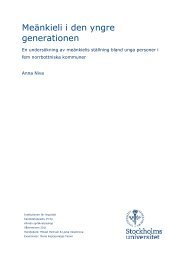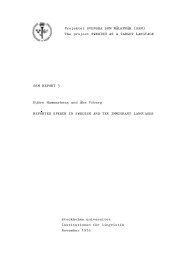The Double Passive in Swedish - Institutionen för lingvistik ...
The Double Passive in Swedish - Institutionen för lingvistik ...
The Double Passive in Swedish - Institutionen för lingvistik ...
You also want an ePaper? Increase the reach of your titles
YUMPU automatically turns print PDFs into web optimized ePapers that Google loves.
In (Figure 11), the agent is suppressed, which creates an argument structure that triggers an equi verb<br />
to behave as a rais<strong>in</strong>g verb. <strong>The</strong> mapp<strong>in</strong>g <strong>in</strong> (Figure 11) also illustrates that the agent is suppressed<br />
twice.<br />
Bilen planera-s (Ø) skrota-s (Ø)<br />
Car:the plan-PASS scrap:INF-PASS<br />
‘As for the car, it is be<strong>in</strong>g planned to be scrapped’.<br />
Figure 11. Non-overt agents <strong>in</strong> the <strong>Double</strong> <strong>Passive</strong> creates a rais<strong>in</strong>g construction.<br />
<strong>The</strong> subject relation is not associated with a semantic role <strong>in</strong> the argument structure of (Figure 11), so<br />
the <strong>Double</strong> <strong>Passive</strong> is a functionally controlled rais<strong>in</strong>g construction, cf. (55):<br />
(55) planera < Ø, prop><br />
OBLag XCOMP<br />
5.2.2 Semantic bond<strong>in</strong>g<br />
When the ten verbs chosen from the corpus research (cf. Table 2) was sorted accord<strong>in</strong>g to Givón’s<br />
(2001a:69-80) semantic sub-groups (Cf. Appendix C), they occurred <strong>in</strong> the follow<strong>in</strong>g categories:<br />
Modality verb Positive modal attitude: ’avse’ (‘<strong>in</strong>tend’), ‘planera’<br />
(‘plan’), ‘<strong>för</strong>vänta’ (‘expect’), ‘beräkna’ (‘calculate’),<br />
‘riskera’ (‘risk’).<br />
Manipulation verbs Successful manipulation: ’tv<strong>in</strong>ga’ (’force’).<br />
Attempted manipulation: ‘tillåta’ (‘allow’), ‘<strong>för</strong>eslå’<br />
(‘suggest’), ‘hota’ (‘threat’).<br />
PCU verbs Non-factive (positive): ‘påstå’ (‘claim’).<br />
<strong>The</strong> modality verbs are dom<strong>in</strong>at<strong>in</strong>g <strong>in</strong> frequency (1 401 hits), and among several groups of modality<br />
verbs, the modality verbs solely occurred <strong>in</strong> the group “Positive modal attitude” (Givón 2001a). <strong>The</strong>re<br />
are four Manipulation verbs accord<strong>in</strong>g to the mapp<strong>in</strong>g, but the total frequency (578 hits) is no were<br />
near the dom<strong>in</strong>at<strong>in</strong>g modals. Out of the ten verbs, one hit of a PCU verb was identified (26 hits). <strong>The</strong><br />
Distribution of the 10 verbs accord<strong>in</strong>g to group of semantic bond<strong>in</strong>g is shown <strong>in</strong> (Table 7):<br />
38



